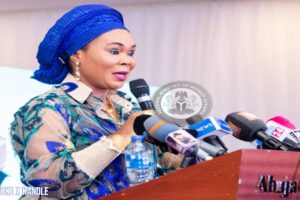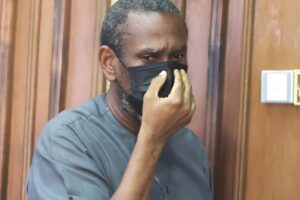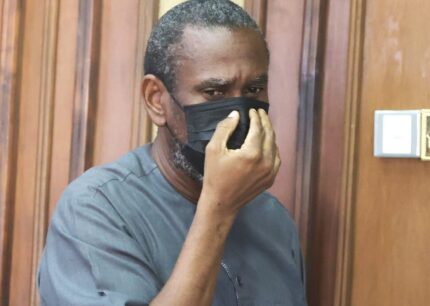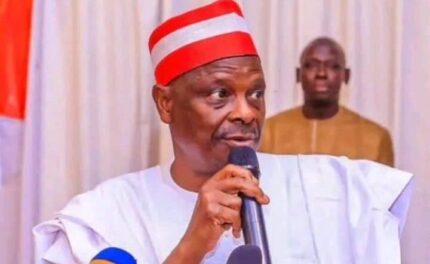The Economic and Financial Crimes Commission (EFCC) on Monday, December 24, 2024, arraigned businessman Akindele Akintoye before Justice Emeka Nwite of the Federal High Court, Maitama, Abuja, on charges of money laundering and contract fraud. Akintoye is accused of diverting $35 million provided by the Nigeria Content Development and Monitoring Board (NCDMB) for the construction of a state-of-the-art refinery and associated facilities in Bayelsa State.
The funds were allegedly funneled through his company, Atlantic International Refinery and Petrochemical Limited, and redistributed into four of his other entities: Platform Capital Investment Partners, Duport Midstream Company Ltd., Puisance Afrique Dynamics Ltd., and Adamantine Petrochemical & Refinery Ltd. The EFCC claims Akintoye also used Bureau de Change outlets to further obscure the trail of the funds, which were intended for a 2,000-barrel-per-day refinery, a jetty, a gas plant, and other critical infrastructure.
Details of the Charges and Court Proceedings
During the court session, EFCC counsel Ekele Iheanacho, SAN, presented a four-count charge against Akintoye, originally filed on November 19, 2024. One of the charges alleged that Akintoye, alongside Platform Capital Investment Partners Limited, illegally retained $16,006,000 between December 2020 and February 2021. The funds were reportedly dishonestly converted from NCDMB’s investment and constitute proceeds of unlawful activity, contravening Section 15(2)(d) of the Money Laundering (Prohibition) Act, 2011 (as amended).
Akindele Akintoye pleaded “not guilty” to all charges. Following his plea, Iheanacho requested that Akintoye be remanded in a correctional facility and called for a trial date. The EFCC counsel also raised concerns about Akintoye’s alleged history of untrustworthiness, including his retrieval of an international passport previously claimed to be in court custody.
Defense Seeks Bail Amid Remand Debate
Defendant counsel Emmanuel Esadio submitted a bail application, emphasizing his client’s health challenges and the need for unhindered legal counsel access. Esadio also requested Akintoye’s temporary remand in EFCC custody, citing inadequate healthcare facilities at correctional centers.
However, Iheanacho opposed the defense’s request, arguing that the EFCC lacks sufficient facilities for detention and healthcare. He maintained that Akintoye posed a significant flight risk and could potentially engage in further criminal activities if granted EFCC custody. The prosecution further noted the absence of medical evidence substantiating Akintoye’s health claims.
Justice Nwite highlighted the tripartite nature of justice, underscoring the need to consider the rights of the accused, the prosecution, and society. He deferred the bail decision, stating that the prosecution must be allowed the legally mandated 48-hour period to respond to the application.
Court Decision and Next Steps
After hearing both parties, Justice Nwite ordered Akindele Akintoye’s remand at the Kuje Correctional Centre, rejecting the plea for EFCC custody. The court adjourned the case to December 31, 2024, for the hearing of the bail application.
The EFCC remains resolute in pursuing justice, emphasizing the gravity of the charges and their implications for Nigeria’s anti-corruption drive. The upcoming hearing will be pivotal in determining whether Akintoye will secure bail or continue his detention pending trial. This case underscores the government’s commitment to tackling financial crimes and ensuring accountability for public funds.
EFCC Call for Community Support in Anti-Corruption Efforts
The case underscores the critical need for public support in Nigeria’s anti-corruption drive. The EFCC, despite its efforts, faces challenges that community intelligence gathering could help address. Collaborative efforts are essential to tackle complex financial crimes and restore Nigeria’s tarnished international image.
A strong anti-corruption stance is not just about legal victories but also about improving Nigeria’s global reputation and fostering economic development. For agencies like the EFCC to succeed, public cooperation is indispensable, ensuring that financial criminals are not only apprehended but also held accountable in ways that deter future offenses.
Table of Contents
Discover more from OGM News NG
Subscribe to get the latest posts sent to your email.














